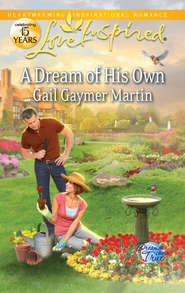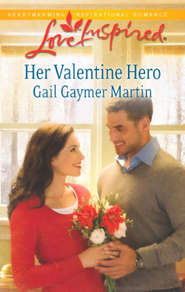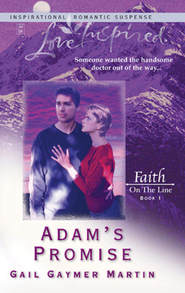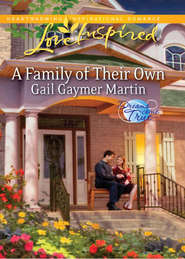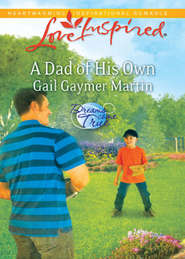По всем вопросам обращайтесь на: info@litportal.ru
(©) 2003-2025.
✖
Upon a Midnight Clear
Автор
Год написания книги
2018
Настройки чтения
Размер шрифта
Высота строк
Поля
David stared at her curiously, his head tilting to one side as he searched her face. She swallowed, feeling the heat of discomfort rise in her again.
“You have strong feelings about music.” His words were not a question.
“Yes, I do. She’ll sing. After her pain goes away.” Callie’s thoughts turned to a prayer. Help me to sing again, Lord, when my hurt is gone.
“Excuse me.” David Hamilton rose. “I want to see if Agnes is bringing our tea.” He stepped toward the door, then stopped. “Do you like tea?”
Callie nodded. “Yes, very much.”
He turned and strode through the doorway. Callie drew in a calming breath. Why did she feel as if he were sitting in judgment of her, rather than interviewing her? She raised her eyebrows. Maybe he was.
In only a moment, David spoke to her from the parlor doorway. “Agnes is on her way.” He left the door open, and before he had crossed the room, the woman she’d seen earlier entered with a tray.
“Right here, Agnes. On the coffee table is fine.” He gestured to the low table that stretched between them. “Miss Randolph, this is Agnes, my housekeeper. She’s caring for Nattie until I find someone.”
“We met at the door. It’s nice to know you, Agnes.” The woman nodded and set the tray on the highly polished table.
“Agnes has been a godsend for us since we lost Miriam.”
“Thank you, Mr. Hamilton,” she said, glancing at him. “Would you like me to pour?”
“No, I’ll get it. You have plenty to do.” With a flicker of emotion, his eyes rose to meet the woman’s. “By the way, have you checked on Nattie lately?”
“Yes, sir, she’s coloring in her room.”
“Coloring? That’s good. I’ll take Miss Randolph up to meet her a bit later.”
Agnes nodded and left the room, closing the door behind her. David poured tea into the two china cups. “I’ll let you add your own cream and sugar, if you take it,” he said, indicating toward the pitcher and sugar bowl on the tray. “And please have a piece of Agnes’s cake. It’s lemon. And wonderful.”
Callie glanced at him, astounded at the sudden congeniality in his voice. The interview had felt so ponderous, but now he sounded human. “Thanks. I take my tea black. And the cake looks wonderful.” She sipped the strong tea, and then placed the cup on the tray and picked up a dessert plate of cake.
David eyed her as she slivered off a bite and forked it into her mouth. The tangy lemon burst with flavor on her tongue. “It’s delicious.”
He looked pleased. “I will say, Agnes is an excellent cook.”
“Has she been with you long?”
He stared into the red glow of the firelight. “No—a half year, perhaps. Miriam, my past housekeeper, took Nattie—took all of us—under her wing when Sara died. She had been with my parents before their deaths. A longtime employee of the family. She retired. Illness and age finally caught up with her. Her loss has been difficult for us.”
He raised his eyes from the mesmerizing flames. “I’m sorry, Miss Randolph. I’m sure you aren’t interested in my family tree, nor my family’s problems.”
“Don’t apologize, please. And call me Callie.” She felt her face brighten to a shy grin. “Miss Randolph sounds like my maiden aunt.”
For the first time, his tense lips relaxed and curved to a pleasant smile. “All right. It’s Callie,” he said, leaning back in the chair. “Is that short for something?”
“No, just plain Callie.”
He nodded. “So, Callie, tell me how a young woman like you decided to care for the elderly. Why not a position in a hospital, regular hours so you could have fun with your friends?”
She raised her eyes to his and fought the frown that pulled at her forehead. Never had an interview caused her such stress. The man seemed to be probing at every nerve ending—searching for what, she didn’t know. She grasped for the story she had lived with for so long.
“When I graduated from college, I had romantic dreams. Like Florence Nightingale, I suppose. A hospital didn’t interest me. I wanted something more…absorbing. So I thought I’d try my hand at home care. The first job I had was a cancer patient, an elderly woman who needed constant attention. Because of that, I was asked to live in their home, which suited me nicely.”
“You have no family, then?”
She swallowed. How could she explain her relationship with her mother. “Yes, my mother is living. My father died about three years ago. But my mother’s in good health and active. She doesn’t need me around. My siblings are older. My brother lives right outside Indianapolis. My sister and her husband live in California.”
“No apartment or home of your own?”
“My mother’s house is the most permanent residence I have. No, I have no other financial responsibilities, if that’s what you’re asking.”
David grimaced. “I wasn’t trying to pry. I wondered if a live-in situation meets your needs.”
“Yes, but most important, I like the involvement, not only with the patient, but with the family. You know—dedication, commitment.”
A sound between a snicker and harrumph escaped him. “A job here would certainly take dedication and commitment.”
“That’s what I want. I believe God has a purpose for everybody. I want to do something that has meaning. I want to know that I’m paying God back for—”
“Paying God back?” His brows lifted. “Like an atonement? What kind of atonement does a young woman like you have to make?”
Irritation flooded through her, and her pitch raised along with her volume. “I didn’t say atonement, Mr. Hamilton. I said purpose. And you’ve mentioned my young age often since I’ve arrived. I assume my age bothers you.”
The sensation that shot through Callie surprised even her. Why was she fighting for a job she wasn’t sure she wanted? A job she wasn’t sure she could handle? A sigh escaped her. Working with the child wasn’t a problem. She had the skills.
But Callie was the problem. Already, she found herself emotionally caught in the child’s plight, her own buried feelings struggling to rise from within. Her focus settled upon David Hamilton’s startled face. How could she have raised her voice to this man? Even if she wanted the position, any hopes of a job here were now lost forever.
David was startled by the words of the irate young woman who stood before him. He dropped against the back of his chair, peering at her and flinching against her sudden anger. He reviewed what he’d said. Had he made a point of her age?
A flush rose to her face, and for some reason, she ruffled his curiosity. He sensed a depth in her, something that aroused him, something that dragged his own empathy from its hiding place. He’d felt sorry for himself and for Nattie for such a long time. Feeling grief for someone else seemed alien.
“To be honest, Miss Rand—Callie, I had thought to hire an older woman. Someone with experience who could nurture Nattie and bring her back to the sweet, happy child she was before her mother’s death.”
Callie’s chin jutted upward. Obviously his words had riled her again.
“Was your wife an old woman, Mr. Hamilton?”
A rush of heat dashed to his cheeks. “What do you mean?”
“I mean, did your wife understand your child? Did she love her? Could she relate to her? Play with her? Sing with her? Give her love and care?”
David stared at her. “Wh-why, yes. Obviously.” His pulse raced and pounded in his temples, not from anger but from astonishment. She seemed to be interviewing him, and he wasn’t sure he liked it, at all.
“Then why does a nanny—a caregiver—have to be an elderly woman? Can’t a woman my age—perhaps your wife’s age when she died—love and care for your child? I don’t understand.”
Neither did he understand. He stared at her and closed his gaping mouth. Her words struck him like icy water. What she said was utterly true. Who was he protecting? Nattie? Or himself? He peered into her snapping eyes. Spunky? Nervy? No, spirited was the word.
He gazed at the glowing, animated face of the woman sitting across from him. Her trim body looked rigid, and she stared at him with eyes the color of the sky or flowers. Yes, delphiniums. Her honey-colored hair framed an oval face graced with sculptured cheekbones and full lips. She had fire, soul and vigor. Isn’t that what Nattie needed?






